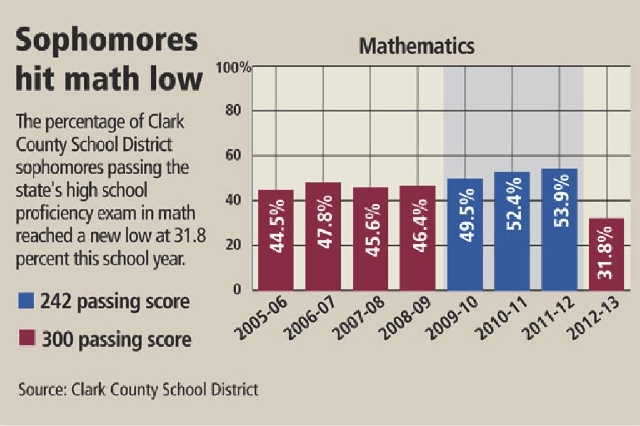Clark County School District sophomores bottom out on state’s math proficiency exam
More than two-thirds of Clark County School District sophomores failed the state’s math proficiency exam this year, a new low for first-time test-takers in recent history.
About 15,000 of 22,100 sophomores, or 68 percent, were just informed of their failure on the March test, which they must pass to earn a diploma in Nevada. Three other proficiency exams — in reading, writing and science — are now needed for graduation, although lawmakers are considering eliminating the requirement. Those who fail can retake the tests as juniors and seniors.
CCSD Interim Superintendent Pat Skorkowsky attributed the poor math results to the state raising the passing score, but Nevada education officials said the change merely restored the bar to its 2010 level. The State Board of Education temporarily lowered the mark when it adopted new curriculum standards, the Common Core, which are used in 45 states.
The intent was to give districts time to adjust to the new material, train teachers and intervene with struggling students, said Interim State Superintendent of Public Schools Rorie Fitzpatrick. That way, when the math proficiency pass score was restored, students would be ready.
“That was the idea. It didn’t happen,” Fitzpatrick said.
Statewide, the math proficiency pass rate for sophomores dropped from 54 percent in 2011-12 to 32 percent this year.
WHY THE DECLINE?
For the past three years, students needed a score of 242 out of 500, or 48 percent, to pass the math test. The minimum pass score this year changed to 300 out of 500, or 60 percent.
“We knew there was the potential for the pass rate to drop significantly,” Skorkowsky said. “It’s always a challenge when you raise the cut score.”
However, the last time the score was set at 300, in 2008-09, just over 46 percent of sophomores were successful on their first attempt.
Washoe County, the state’s second-largest district after CCSD, had a 35 percent pass rate. Many rural districts logged sophomore math proficiency pass rates in the teens.
“The question you might want to ask districts is what they did during that time,” Fitzpatrick said of the transitional years since the new standards were adopted.
Districts may not have “fully appreciated” the need for math remediation for students, she suggested.
Math is a clear problem area, as shown by student performance on that exam. Scores for the other exams have remained fairly constant despite the switch to Common Core.
In Clark County, sophomore pass rates on the reading and science exams this year improved by a few percentage points, with 54 percent of students passing the reading test and 59 percent passing the science test. The writing test is first given to juniors.
Skorkowsky said the district has been working to raise math scores over the past two years, offering online credit retrieval courses and “proficiency camps” for struggling students.
But the district’s own testing shows those efforts were falling woefully short. Just 13 percent of high school students enrolled in pre-algebra passed the final exam in 2011-12.
Algebra 1 students tested almost as poorly, with less than 19 percent passing their finals.
REQUIRING MORE OF STUDENTS
There is another issue with Common Core, which isn’t just a replacement of an outdated curriculum, said Green Valley High School Principal Jeff Horn, a former math teacher.
Teachers are expected to cover more material than before in the same amount of instructional time, he said.
The expectation is compounded by the district’s average high school class size, which is at an all-time high of 38.
“The material to be covered is enormous,” Horn said. “It snowballs from there, especially in math where the material builds on itself.”
The lack of new curriculum training for Clark County teachers may have something to do with it, said Bill Hanlon, director of the Regional Professional Development Program training Southern Nevada teachers.
“The whole emphasis has been off-target,” said Hanlon, noting that the district has been preparing teachers for its now defunct School Performance Framework, a growth-based rating system introduced by former Superintendent Dwight Jones, who abruptly resigned in March.
The district hasn’t been preparing teachers on the material they must teach under the Common Core, Hanlon said.
LAWMAKERS CONSIDER KILLING THE TEST
There soon may be no high school proficiency exam requirement in Nevada, Skorkowsky noted.
Assembly members on Tuesday voted 41-0 to abolish the exam. Under the current law, seniors who can’t pass the tests get a certificate of attendance instead of a diploma, a practice that would be abolished by Assembly Bill 288.
Assemblywoman Lucy Flores, D-Las Vegas, said the proficiency exam would be replaced by end-of-course tests based on what students are taught.
The proficiency exams have questions based on material not taught in Nevada, she contends.
Review-Journal writer Ed Vogel contributed to this report. Contact reporter Trevon Milliard at tmilliard@ reviewjournal.com or 702-383-0279.
Highs and Lows
Clark County School District high schools with the highest and lowest 2012-13 sophomore pass rates on the state’s math proficiency exam:
Highest Pass Rates
• Advanced Technologies Academy: 76%
• West Career and Technical Academy: 72%
• Las Vegas Academy: 60%
• Coronado High School: 59%
• Southwest Career and Technical Academy: 57%
• Northwest Career and Technical Academy: 56%
• Veterans Tribute Career and Technical Academy: 51%
• East Career and Technical Academy: 50%
• Boulder City High School: 47%
• Sandy Valley High School: 45%
Lowest Pass Rates
• Sunrise Mountain High School: 9%
• Mojave High School: 11%
• Eldorado High School: 12%
• Desert Pines High School: 13%
• Cheyenne High School: 13%
• Western High School: 14%
• Canyon Springs High School: 16%
• Chaparral High School: 16%
• Cimarron-Memorial: 18%
• Del Sol High School: 19%






















